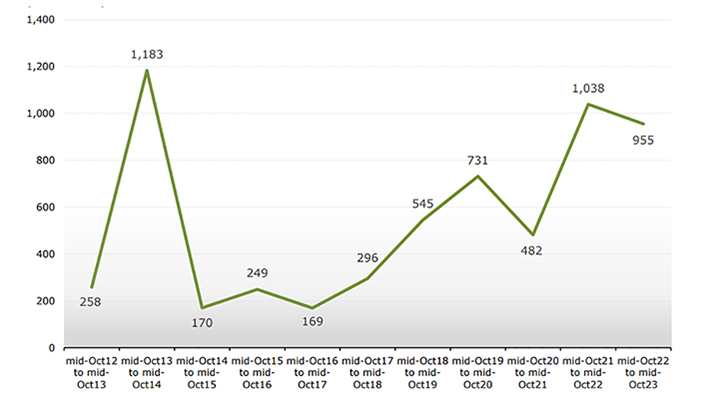
Pointing to the multiple crises disrupting the global economic environment, Director-General Ngozi Okonjo-Iweala welcomed members’ introduction of trade-facilitating measures and called on them to roll back recent food export restrictions as well as the accumulated stockpile of longstanding trade-restricting measures. She urged members to do their part to put the world economy on firmer footing by working collectively to reinforce the multilateral trading system and delivering results at the 13th Ministerial Conference (MC13) early next year.
“The fact WTO members have been taking more practical steps to facilitate imports is welcome and illustrates how reducing trade barriers and delays is a valuable tool for pushing back against inflationary pressures. That said, the pace of implementation of new export restrictions has increased since 2020, first with regard to medical products in the context of the COVID-19 pandemic, and subsequently vis-à-vis food, animal feed and fertilizer with the war in Ukraine,” she said.
DG Okonjo-Iweala noted that over several decades, and more recently at the post-pandemic recovery, trade has been a strong force for prosperity and resilience across the membership and WTO members have a responsibility to ensure that this continues. At the same time, too many people and members have not shared adequately in this prosperity, she said.
“Bringing them from the margins to the mainstream of global trade — what we are calling ‘re-globalization’ — would make the world economy simultaneously more inclusive and more resilient. That is why we must keep working to reform and strengthen the multilateral trading system and the WTO. This means building on our collective successes at the 12th Ministerial Conference by delivering more results at MC13 in Abu Dhabi in February,” she added.
During the review period, WTO members introduced more trade-facilitating (303) than trade-restrictive (193) measures on goods. Most of the trade-facilitating measures were on the import side, while the majority of trade restrictions were on the export side. This marked only the third time since the beginning of the Trade Monitoring Exercise in 2009 that the number of new export restrictions (99 or 51% of all) exceeded that of import restrictions (93 or 48%).
The trade coverage of the trade-facilitating measures was estimated at USD 977.2 billion (down from USD 1,160.5 billion in the last annual report), and that of the trade-restrictive measures at USD 337.1 billion (up from USD 278.0 billion in the last report). The stockpile of import restrictions implemented since 2009 shows little meaningful roll-back. For 2023, the trade covered by import restrictions in force dating back to 2009 was estimated at USD 2,480 billion, representing almost one tenth of total world imports.
The average number of trade remedy initiations by WTO members was 12.1 per month during the review period, down from its highest peak so far in 2020 (36.1 initiations per month). The monthly average of trade remedy terminations during the same period was 8.3, the lowest average since 2012. Trade remedy actions, especially anti-dumping measures, remain an important trade policy tool for many WTO members, accounting for 33% of all non-COVID-19-related trade measures on goods recorded in this report.
The report shows that the pace of implementation of new export restrictions on food, feed and fertilizers by WTO members has increased, and of the 122 such measures introduced since February 2022, 75 remained in place globally as of mid-October 2023.
In services trade, 123 new measures were introduced by WTO members, most of which were trade-facilitating, either liberalizing or moving towards an improved regulatory framework. The review period saw a significant increase in the number of new general economic support measures by WTO members, including various environmental impact reduction programmes.
The implementation of new COVID-19 trade-related measures by WTO members decelerated further during the review period. Since the outbreak of the pandemic, 458 trade and trade-related measures in goods have been implemented by WTO members and observers. While the majority of these measures were trade-facilitating (255 or 56%), trade in some products was significantly disrupted by the restrictions.
As of mid-October 2023, 84.7% of the COVID-19-related trade restrictions had been repealed, leaving 20 export restrictions and nine import restrictions in place. The trade coverage of the pandemic-related trade restrictions still in place was estimated at USD 15.6 billion (down from USD 134.6 billion in the previous annual report). In the area of services, 156 COVID-19-related measures have been introduced since the beginning of the pandemic, most of which are still in place (22 have been terminated, and three partially).
The updated lists of measures implemented in the context of the current pandemic are available on the COVID-19 page of the WTO website and cover the areas of goods, services and intellectual property as well as measures communicated by members on general economic support.
Share
Reach us to explore global export and import deals